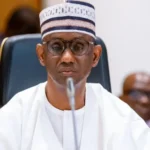Most public schools located in Kaduna metropolis are wearing a new look following the intervention of the state government under the leadership of Governor Nasir El-Rufai.
Many of the schools were completely renovated while some with a large number of pupils had one-storey buildings constructed to accommodate the pupils. The state government also built more model schools within the city.
For instance, LEA Primary School Rigasa, which has about 20,000 pupils, now has new classes built to accommodate more pupils. LEA Unguwar Sarki was also renovated as well as Kaduna Capital School, where the governor’s son was recently enrolled.
At the LEA Primary School Unguwan Shanu/Abakpa, which was visited by our reporter, the school premises wears a new look with freshly painted classrooms, new doors and windows and roofs in perfect condition.
The pupils and staff were also smartly dressed and receiving lessons while seated on chairs and tables in a very clean environment.
However, one worrisome challenge the school is facing is that the toilets have not been connected to water systems, making them inactive.
A staff of the school, who spoke on condition of anonymity, said the school was renovated twice; first before the coming of the All Progressives Congress (APC) administration in 2013 and 2014. Then, as soon as Malam Nasiru El- rufai came in as governor, he awarded another project to the school in 2016.
The project, he said, “was to renovate the whole school, which has been done. Water system toilets were also built, except that it has not been connected up till now so the school is presently using its old pit toilet.”
He noted that the school is still in need of more classrooms, saying, “With the free education policy initiated by the Kaduna State government, the enrollment rate has doubled if not tripled.”
Despite the effort of the government in renovating public schools in the city, there are still many with dilapidated structures.
Government Junior Secondary School (GJSS) Rigachikun, which runs only the morning session with 2084 students and 30 teachers, lacks chairs and tables both for staff and students.
Though the classes are in deplorable conditions, the students still receive lessons in them due to inadequate classrooms to accommodate the school’s population.
The lack of classrooms has affected teaching and learning in the school as the school is forced to merge some of its students into one class because of damaged structures and inadequate space.
A senior staff of the school, who did not want to be mentioned, said the junior section of the school was established in 2008, and in 2008 and 2012, the school benefitted from UBEC projects which have all been completed. He, however, noted that because of wear and tear, the building needs attention.
The staff also lamented the absence of materials in the laboratory for practical experiments. “It will be good if those things can be provided so that when we are teaching them, the students will be able to identify what they are being taught.”
At the Government Junior Secondary School Nasarawa (GJSSN), the school, which is two blocks of 4 classrooms, started as a community school before it was converted to a government school.
Since its conversion in 2006, the school has not been renovated or given additional classrooms or toilet. The buildings are in bad condition with leaking roofs and falling ceilings and the school is always flooded during the rainy season.
The school, which has about 800 students; 120 per class, has only two pit toilets, one for the teachers and one for the students.
It also lacks a perimeter fence for security, water and a conducive learning environment due to the noise from cars passing through the school because of its location.
Residents have appealed that a new site should be awarded to the school for the construction of classrooms because there is no room for expansion at the present site.
At the Government Junior Secondary School Narayi, teaching and learning still take place in the two classrooms, despite the fact that the ceiling and floor have started to wear off. Although the school has been fenced, there are however holes and exits at various locations within the fence created by students.
It was also observed that the school, which has both junior and senior sections, has two toilets – one for staff and one for the students.
Also, despite intervention by the Parents Teachers Association (PTA), many classes in the school are in a deplorable state and in need of rehabilitation.
“The school does not also have a proper laboratory but converted one of its classrooms to be used as a temporary laboratory.
“The school needs more classes because, despite the fact that we run two shifts, there are over 100 students in a class, which is not conducive for teaching and learning,” said a staff of the school.
Other schools presently in deplorable condition include LEA Kagoro Road in Tudun Wada, LEA Faki Road also in Tudun Wada, LEA Chawai Road among others.
Experts react
Experts in the educational sector have reacted to Governor Nasir El-Rufai’s decision to enrol his son Abubakar Siddique in a public school, with a call on other top government officials to emulate the governor.
According to the experts, with the governor’s action, there is no reason why the Commissioner for Education and other directors in the ministry would not enrol their kids in public schools.
They also described Governor El-Rufai’s decision as a positive move towards uplifting the standard of education in the state.
A former Education Secretary in Kaduna South Local Government Area, Sanusi Surajo , said the governor’s action will make teachers in the school the governor’s child attends to change their attitude towards teaching.
He also said the governor has set the pace for other officials to also do same by enrolling their children in public schools.
“There is no reason why you should be telling people to take a particular medicine while you are not taking the same medicine. You keep saying there are quacks in public schools, but your children are attending private schools.
“Secondly, his son attending a public school will tell him the condition of those schools. Thirdly, other children in the same class with the son of the governor will feel proud to be in the same class as the governor’s son.
“Also, the teachers will change their pattern of teaching in the school because the governor’s son is in school. The Ministry of Education will also focus attention on the school and that will also give them a picture of what is happening in other schools the governor’s child doesn’t attend.
“So, other public office holders need to emulate the governor because if the governor will take his child to a government-owned school, what stops the commissioner of education from doing the same? What stops other directors and top officials in the ministry of education from keying in by enrolling their children in such schools?” he said.
On whether the governor’s action was political, Malam Sanusi Surajo said “yes, it could be a political move, but it doesn’t matter because it’s a way of telling those managing education to change their attitude. I was once an educational Secretary and my children all attended public schools.
“That tells me what was happening in those schools, so I’m appealing to politicians and those in public offices to follow suit by providing an enabling environment for learning in the state,” he said.
Another educationist, Malam Abdulganeeyu Abdurrahman Giwa, described the governor’s move as a solution to the revival of public schools in the state.
He said if other elites in the state will take their children to public schools, they will surely pay attention to how the children are being taught in those schools.
“This is the best method of uplifting education in public schools in the state. With this, I don’t think such schools will be left without teaching materials for teachers. If those in the education ministry will follow the governor’s footstep, public schools will regain their former glory,” he said.

 Join Daily Trust WhatsApp Community For Quick Access To News and Happenings Around You.
Join Daily Trust WhatsApp Community For Quick Access To News and Happenings Around You.


